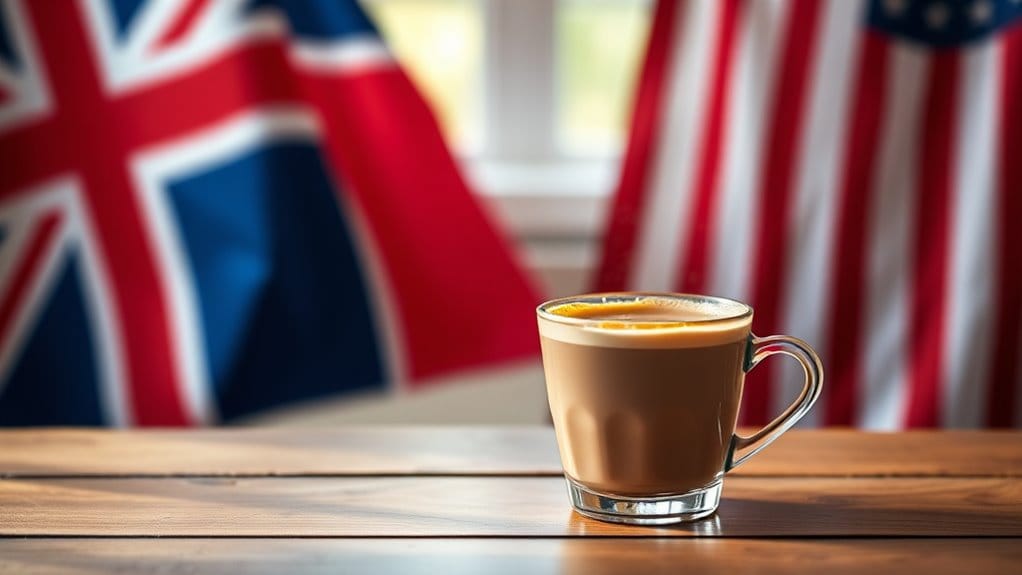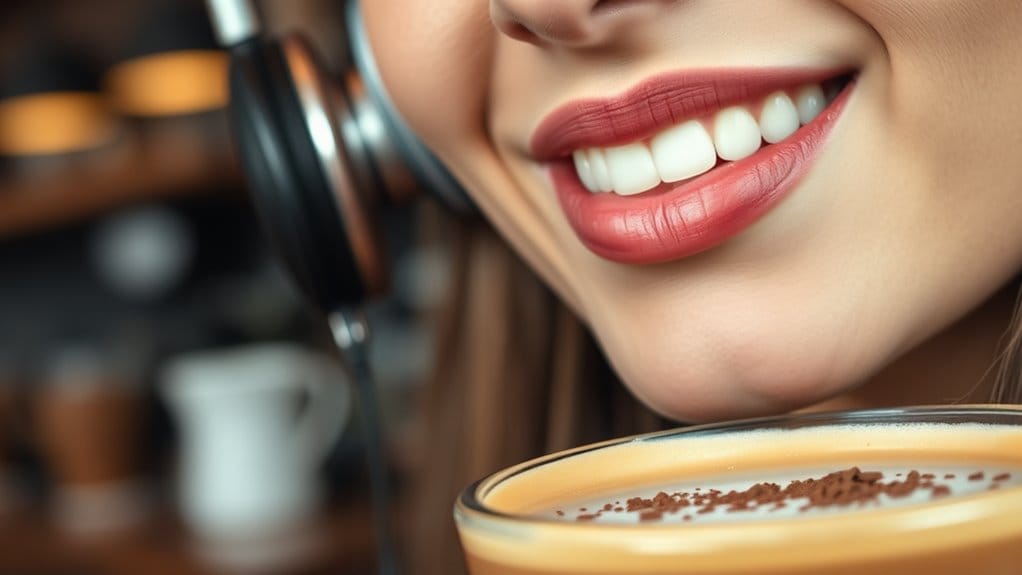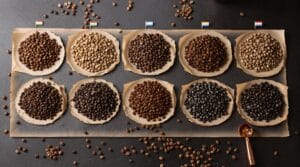Mastering “mocha” starts by splitting it: “moh-kuh,” stressing “moh” (m + a playful “o”). Next, notice accent twists—Americans stretch the “o” (“moh-kuh”), Brits shorten it (“mock-uh”). Ultimately, train using audio tools (Youglish, YouTube) to mimic baristas, recording yourself until it flows. Bonus tip: It’s a coffee order, not a Shakespearean soliloquy—keep it breezy! Want to sound like a pro? The full brew’s ahead.
Breaking Down the Phonetic Components
To master *mocha* pronunciation, start with its building blocks—the sounds your mouth makes! Firstly, tackle the /m/ sound by closing your lips, like humming “mmm” (think “moon” or “mother”).
Next, the vowel splits: Brits say /ɒ/ (like “sock”), while Americans stretch into /oʊ/ (like “go”). Then, the crisp /k/ pops in, made by your tongue hitting the roof of your mouth—say “cat” or “coffee” to practice.
Ultimately, end with the lazy /ə/ (“uh”) sound, just relax your lips—it’s the same as the end of “sofa”! Nailing these parts—/m/, vowel, /k/, and schwa—helps you spell *mocha* correctly and say it confidently.
Bonus tip: stress the first syllable, and voilà—ownership of that coffee-shop order! For optimal learning, check if your browser supports audio files for pronunciation to hear authentic UK and US renditions—some platforms require updated software for playback.
Comparing UK and US Pronunciation Differences

The melody of language dances differently across the Atlantic, turning *mocha* into a pronunciation playground! In American English, the O stretches into a playful diphthong (/oʊ/), like “oh” sliding into “uh,” while British speakers might crisp it as a shorter, rounded /ɒ/ or a clipped /əʊ/.
Whether it’s a cozy London café or a New York coffee cart, that initial syllable reigns supreme—both accent styles stress it boldly. This trend mirrors broader patterns where AmE often stresses different syllables in loanwords, as seen in *hotelier* (AmE: /hoʊˈtɛliər/ vs BrE: /həʊˈtɛliə/).
But regional quirks twist the script: some UK dialects swap in an “ah” sound (/ɒ/), and Southern US drawls might linger on that O.
Connoisseurs of caffeine and consonants, fear not! The K stays punchy across both, and that final “uh” (/ə/) remains a chillout vowel.
Order confidently; even if your *mocha* carries an accent, the barista’s still brewing your cup!
Practicing With Audio Examples and Tools

Mastering the tricky “mocha” sound feels like sipping perfect coffee—smooth, but needing practice! Tools and audio examples reveal freedom to refine pronunciation, blending tech and creativity.
- Ride the audio wave: Sites like Youglish and HowToPronounce flood ears with native speakers saying “*mo*-kuh,” letting learners mimic rhythms like a catchy song stuck on repeat.
- Channel-surf for clarity: YouTube tutorials show tongue positions and mouth shapes, hitting pause to practice slow-motion “mocha” like a barista perfecting latte art. Learners should focus on one accent, sticking to either rhythmic American “mah-kuh” or clipped British “mock-uh” to fine-tune muscle memory like a dialect coach.
- Be your own barista: Recording apps turn phones into pronunciation labs—compare your “mocha coffee” to experts, tweaking vowels like adjusting espresso grind size.
Repeat, replay, rewind. Platforms gamify progress with points, badges, and instant feedback, making practice feel like leveling up in a wordy video game.
Visual guides break “mocha” into bite-sized sounds, stressing syllables like a drumbeat. Listeners become speakers, one jitter-free sip at a time!
Frequently Asked Questions
Can “Mocha” Be Hyphenated in Written Form?
The term “mocha” is not typically hyphenated as a standalone noun. Hyphens may apply when “mocha” modifies another noun (e.g., mocha-flavored), though hyphenating “mocha” itself (moc-ha) remains nonstandard unless specified by style guides.
Is “Mocha” Derived From a Specific Language or Culture?
Does a word’s origin reflect its journey across cultures? “Mocha” traces to Yemen’s port Al-Mukhā, Arabic for a coffee-export hub. Borrowed into English, it evolved through trade and European adaptations into a global culinary term.
Does “Mocha” Have Alternate Pronunciations in Non-English Languages?
“Mocha” exhibits varied non-English pronunciations through transliteration and phonemic adaptation. Examples include Russian “mokko,” Chinese “mókǎ,” Japanese “moka,” emphasizing shifts consonant sounds and script requirements in different linguistic systems.
Are There Slang Uses of “Mocha” Affecting Its Pronunciation?
Approximately 60% of slang terms evolve phonetically, yet “mocha” typically retains standard /ˈmoʊkə/ despite cultural adaptations like describing biracial identity or DIY coffee blends. Slang influences contextual usage more than pronunciation, prioritizing metaphorical resonance over phonetic shifts.
How Is “Mocha” Pronounced in Coffee-Related Jargon vs. General Use?
In coffee jargon, “mocha” is pronounced MOH-kuh (hard “k”) reflecting Yemeni origins. In general use, it often shifts to MOH-chuh (soft “ch”), aligning with chocolate-coffee beverages, prioritizing colloquial familiarity over historical accuracy.
References
- https://dictionary.cambridge.org/us/pronunciation/english/mocha
- https://en.wiktionary.org/wiki/mocha
- https://forvo.com/word/mocha/
- https://www.howtopronounce.com/mochã
- https://www.youtube.com/watch?v=dXm5WHCd9cQ
- https://en.wikipedia.org/wiki/American_and_British_English_pronunciation_differences
- https://www.cur.ac.rw/mis/main/library/documents/book_file/digital-65c9d9b5378d54.30332884.pdf
- https://youglish.com/pronounce/chocolate mocha/english/uk
- https://www.webpgomez.com/english/404-british-and-american-english-pronunciation-differences
- https://elsaspeak.com/en/learn-english/how-to-pronounce/mocha





